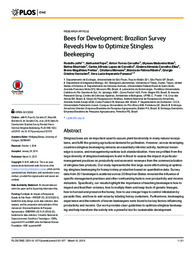Bees for development: brazilian survey reveals how to optimize stingless beekeeping.
Bees for development: brazilian survey reveals how to optimize stingless beekeeping.
Author(s): JAFFÉ, R.; POPE, N.; CARVALHO, A. T.; MAIA, U. M.; BLOCHTEIN, B.; CARVALHO, C. A. L. de; CARVALHO-ZILSE, G. A.; FREITAS, B. M.; MENEZES, C.; RIBEIRO, M. de F.; VENTURIERI, G. C.; IMPERATRIZ-FONSECA, V. L.
Summary: Stingless bees are an important asset to assure plant biodiversity in many natural ecosystems, and fulfill the growing agricultural demand for pollination. However, across developing countries stingless beekeeping remains an essentially informal activity, technical knowledge is scarce, and management practices lack standardization. Here we profited from the large diversity of stingless beekeepers found in Brazil to assess the impact of particular management practices on productivity and economic revenues from the commercialization of stingless bee products. Our study represents the first large-scale effort aiming at optimizing stingless beekeeping for honey/colony production based on quantitative data. Survey data from 251 beekeepers scattered across 20 Brazilian States revealed the influence of specific management practices and other confounding factors over productivity and income indicators. Specifically, our results highlight the importance of teaching beekeepers how to inspect and feed their colonies, how to multiply them and keep track of genetic lineages, how to harvest and preserve the honey, how to use vinegar traps to control infestation by parasitic flies, and how to add value by labeling honey containers. Furthermore, beekeeping experience and the network of known beekeepers were found to be key factors influencing productivity and income. Our work provides clear guidelines to optimize stingless beekeeping and help transform the activity into a powerful tool for sustainable development.
Publication year: 2015
Types of publication: Journal article
Unit: Embrapa Eastern Amazon
Observation
Some of Embrapa's publications are published as ePub files. To read them, use or download one of the following free software options to your computer or mobile device. Android: Google Play Books; IOS: iBooks; Windows and Linux: Calibre.
Access other publications
Access the Agricultural Research Database (BDPA) to consult Embrapa's full library collection and records.
Visit Embrapa Bookstore to purchase books and other publications sold by Embrapa.

